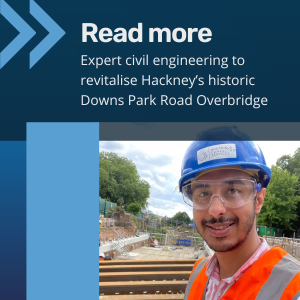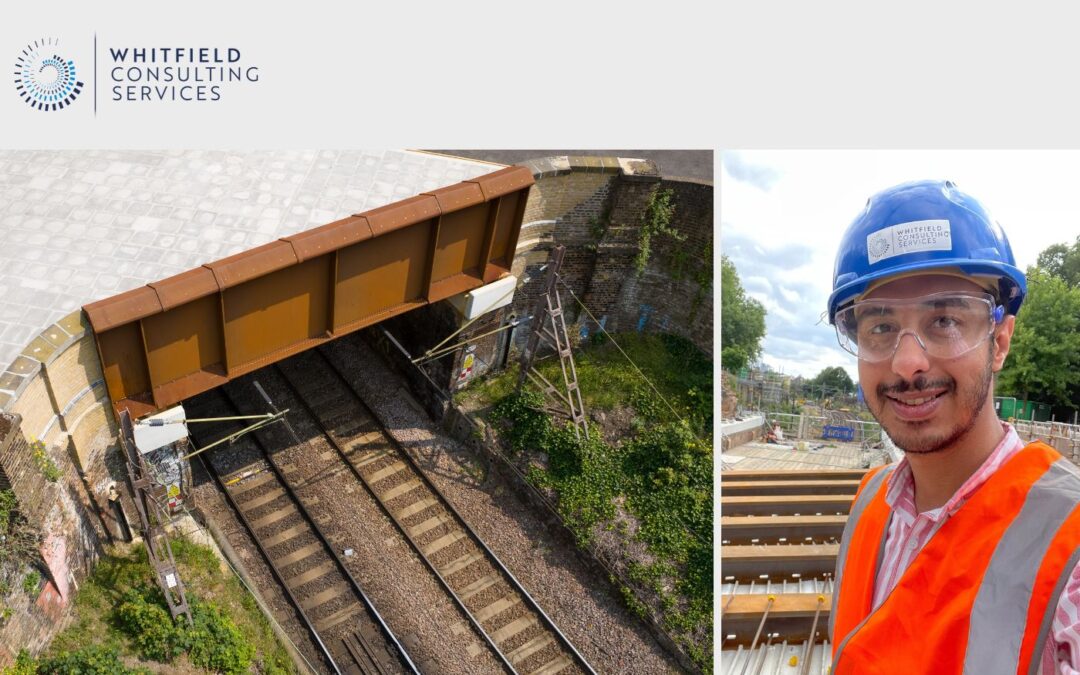By shifting construction operations away from site and into controlled manufacturing environments, consultants and contractors can achieve higher precision, reduce programme risk, lower costs, and realise measurable sustainability gains across infrastructure projects.
This article presents a case study demonstrating how Whitfield Consulting Services (WCS) applied offsite and prefabrication strategies to deliver a technically challenging bridge replacement project within a highly constrained programme.
Engineering decisions by the WCS team resulted in an approximate 25% reduction in embodied carbon and a 30% reduction in costs compared to alternative solutions for the replacement of a deteriorated 19th-century overbridge during a 16-day rail blockade.
Project achievements – WCS delivering success
The Downs Park Road Overbridge in Hackney demonstrates how offsite and prefabricated construction can deliver bridge renewal safely, efficiently, and sustainably.
Through detailed design optimisation and controlled offsite manufacture, WCS achieved an estimated 25% reduction in embodied carbon compared with the conceptual design baseline – approximately 88.7 tonnes of CO₂e (equivalent to the annual emissions of around 60 cars in UK).
The bridge’s new filler beam deck, designed with a fanned beam arrangement to accommodate multiple utilities, was fabricated and trial-erected offsite before installation, enabling precise assembly within constrained site conditions.
As Mohamed Omar, Senior Structural Engineer at WCS – whose work on this project saw him shortlisted as the Bridge Engineer Rising Star 2025 at the New Civil Engineer Bridges Awards – explains:
“Trial erection enables us to de-risk construction from the earliest stages. When design and delivery are fully aligned, we can reduce uncertainty, shorten possession periods, and assure safety in highly constrained environments.”
How WCS reduces programme risk and disruption
Bridge reconstruction in live rail environments demands precise sequencing and minimal site exposure. WCS applied offsite fabrication to reduce on-site duration and mitigate the risk of possession overrun.
“A trial erection at Shay Murtagh Precast in Ireland, prior to delivering to London, streamlined the installation and reduced the risk of delays during the very limited 16-day possession,” Mohamed notes. “This proactive approach gave the construction team confidence that everything would align perfectly on site.”
Integration of temporary works within the permanent design further shortened site operations and eliminated redundant construction activities. This included using the parapet steel girder (1.8m high with 15mm thick web) as shuttering for the reinforced concrete parapet, optimising concrete thickness, and employing GRP panels as permanent formwork for the bridge deck instead of conventional systems. Constructability reviews and detailed sequencing advice supported the contractor in optimising installation and minimising disruption to the local roads, rail network and nearby schools.
Temporary works and construction planning are a part of the great majority of civil and structural engineering projects. The complexity of infrastructure projects, and the possession constraints like those at Downs Park, necessitate temporary works design and coordination on a very specialised scale; learn more in The risks of overlooking temporary works design and coordination in infrastructure projects.
Delivering quality and precision through offsite methods
Controlled fabrication environments provided consistent dimensional accuracy and assured material quality across the bridge’s steel and precast components. WCS developed detailed fabrication drawings, and 3D CAD models for all elements to achieve tight tolerances and maintain alignment. Quality assurance extended through all stages of the project. WCS reviewed inspection and test plans for fabrication and installation.
WCS’s approach delivered a structure of verified integrity, with long-term durability supported by the specification of weathering steel, durable elastomeric bearings, and low-permeability GGBS concrete mixes designed for a 120-year service life.
Tangible carbon, cost, and safety benefits
Quantified analysis using the RSSB Rail Carbon Tool confirmed measurable carbon reductions through structural optimisation, reduced material volumes, and shorter site duration.
“Optimising the structural arrangement, employing precast concrete elements, and a refined construction methodology further reduced construction costs and time,” says Mohamed. “In addition to other savings identified by WCS, these efficiency measures resulted in an estimated 30% cost reduction compared to alternative solutions.”
By prefabricating main structural elements offsite and limiting on-site works, exposure to higher-risk operations was reduced. Shorter possession durations improved overall safety for the workforce and rail operations.
Learn more about the methods civil engineers can use to reduce a project’s carbon footprint; see Sustainable civil engineering practices for resilient railway infrastructure.
Client feedback
Network Rail expressed high satisfaction with the outcome, highlighting the project as an exemplar of collaborative working, innovative design, and efficient delivery under time constraints. Jenny Fowler, Lead Portfolio Manager at Network Rail, shares more about the team effort on LinkedIn (click here).
Murphy commended WCS’s design expertise and technical support. The WCS team provided continuous support, from early stage optioneering to on-site construction assistance.
WCS as a trusted partner
The Downs Park Road Overbridge showcases how offsite and prefabrication strategies can transform bridge renewals by reducing programme risk, improving quality assurance, and delivering measurable sustainability gains. Through early engagement, optimisation, and rigorous coordination, WCS delivered a durable and efficient structure within an intensive operational environment.
“The main outcome,” Mohamed concludes, “was a structure that met all functional and safety requirements, delivered within the possession, and verified for quality from factory to site.”
For clients prioritising certainty, safety, and carbon performance, engaging WCS early enables these methods to be applied effectively from the outset – translating design precision into predictable delivery on site.
These strategies are not limited to bridge and rail projects; WCS applies the same approaches across Power & Energy, and other critical infrastructure projects. This includes our ongoing work on the largest new substation in the network, in terms of gigawatt capacity, where we continue to focus on ensuring efficiency, safety, and sustainability across all sectors.
If you would like to discuss your next project, please get in touch by emailing info@wcs-consult.co.uk or calling +44 (0)20 3581 7847.

